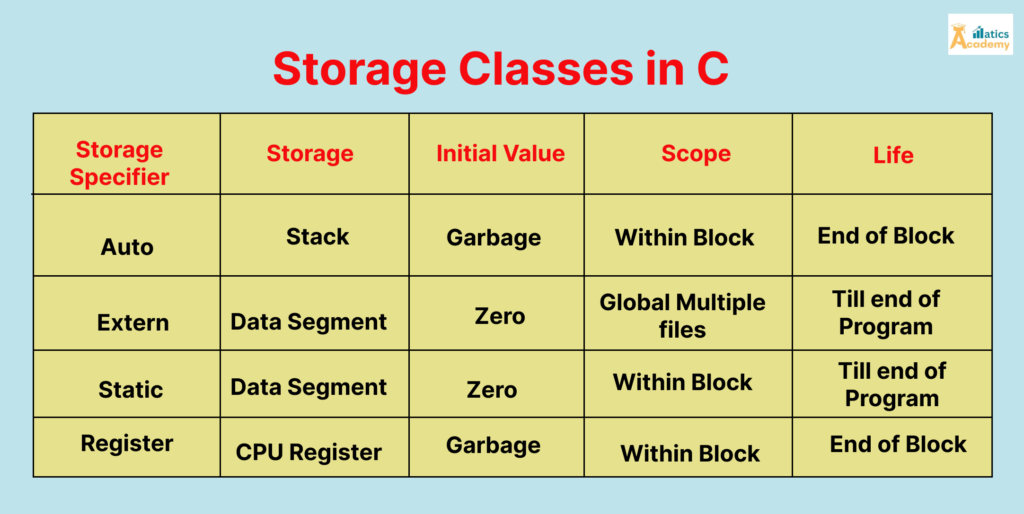Introduction to Storage Classes in C
Storage classes in C programming define a variable’s lifetime, scope, and visibility. By mastering storage classes, you can allocate memory efficiently and optimize program performance. This guide explains storage classes, their types, and best practices to use them effectively.

Key Benefits of Understanding Storage Classes
- Efficient Memory Usage: Using storage classes properly minimizes memory waste.
- Enhanced Program Clarity: They improve code readability by clarifying variable behavior.
- Optimized Performance: Controlling variable scope and lifetime boosts performance.
Types of Storage Classes
C offers four primary storage classes, each with unique characteristics:
- Automatic (auto)
Theautostorage class serves as the default for local variables. It stores variables in the stack and limits their accessibility to the defining block.- Key Features:
- Automatically assigned to local variables.
- The block restricts the scope.
- Lifetime ends when the block exits.
- Key Features:
#include <stdio.h>
void display() {
auto int num = 10; // Local variable with auto storage
printf("Value of num: %d\n", num);
}
int main() {
display();
return 0;
}
- Static (static)
Thestaticstorage classes in C extends a variable’s lifetime to the entire program while keeping its scope local to the block where it is defined.- Key Features:
- Retains value between function calls.
- Persists throughout the program’s execution.
- Scope remains within the defining block or function.
- Key Features:
#include <stdio.h>
void countCalls() {
static int count = 0; // Retains value between calls
count++;
printf("Function called %d times\n", count);
}
int main() {
countCalls();
countCalls();
return 0;
}
- External (extern)
Theexternstorage class allows sharing variables across multiple files. It is useful for declaring global variables or functions in another file.- Key Features:
- Provides global visibility.
- Uses the
externkeyword for declaration. - Lifetime persists for the entire program.
- Key Features:
#include <stdio.h>
int num = 100; // Global variable
void display() {
printf("Value of num: %d\n", num);
}
- Register (register)
Theregisterstorage class suggests storing variables in CPU registers for faster access. However, the compiler may not always adhere to this suggestion.- Key Features:
- Aims to store variables in CPU registers.
- Restricts scope to the block.
- The “
&"operator cannot access the variable’s address.
- Key Features:
#include <stdio.h>
void display() {
register int counter = 10; // Stored in CPU register
printf("Counter: %d\n", counter);
}
int main() {
display();
return 0;
}
Scope, Lifetime, and Visibility
Understanding these concepts ensures effective use of storage classes in C:
- Scope: Specifies where the variable is accessible (block, function, or file).
- Lifetime: Defines how long the variable exists in memory.
- Visibility: Indicates whether other files can access the variable.
Best Practices for Using Storage Classes in C
- Use
autofor temporary variables inside functions. - Choose
staticto retain counters or states within functions. - Opt for
externto share global variables across files. - Use
registerto enhance performance by accessing frequently used variables.
Advantages and Challenges of Using Storage Classes
Advantages:
- Improves memory management.
- Enhances program clarity.
- Boosts execution speed.
Challenges:
- Overusing
staticorexterncan make the code less modular. - Misusing
registermay cause unexpected behavior if registers are limited.
Conclusion
Storage classes in C provide powerful tools to control variable behavior, scope, and memory usage. By learning to use them effectively, you can write efficient and maintainable code. Experimenting with different storage classes will help you understand their impact and optimize your programs.
INTERVIEW QUESTIONS
Question 1: What is the difference between static and extern storage classes in C?
Company: TCS (Tata Consultancy Services)
Answer:
- The
staticstorage class retains a variable’s value between function calls, while its scope remains limited to the block or file where it is defined. On the other hand, theexternstorage class allows a global variable or function to be shared across multiple files. Additionally, its lifetime persists throughout the program.
Example:
static int count; // Retains value within the file extern int globalVar; // Accessible across files
Question 2: How does the register storage class enhance program performance?
Company: Infosys
Answer:
The register storage class improves performance by suggesting that a variable should be stored in a CPU register instead of RAM. Consequently, this allows faster access, especially for frequently used variables. However, the compiler might ignore this suggestion if registers are unavailable.
Example:
register int counter = 0; // Optimized for faster access
for (counter = 0; counter < 10; counter++) {
printf("%d ", counter);
}
Question 3: Why is the auto keyword rarely used in modern C programming?
Company: Wipro
Answer:
In modern C programming, the auto keyword is rarely used because it is the default for local variables. Therefore, explicitly declaring variables with auto is unnecessary. Furthermore, modern compilers already treat local variables as auto by default, which limits its practical use today.
Example:
void func() {
auto int num = 10; // Same as int num = 10;
printf("%d\n", num);
}
Question 4: What are the key limitations of using the register storage classes in C?
Company: Cognizant
Answer:
The register storage class has a few limitations. First, it only suggests storing the variable in a CPU register, but the compiler may not always follow this suggestion. Second, variables declared with register cannot have their addresses accessed using the & operator. Finally, the limited availability of CPU registers can reduce its effectiveness.
Example:
register int num = 5;
// printf("%p", &num); // Error: Cannot access the address
Question 5: Can static variables be used in a multi-file program? Explain.
Company: HCL Technologies
Answer:
Yes, developers can use static variables in a multi-file program. However, they remain restricted in scope to the file where you declare them. This feature, known as “internal linkage,” ensures that static variables in one file cannot be accessed from another file. Consequently, this helps maintain encapsulation.
Example:
static int count = 0; // Cannot be accessed outside File1.c
QUIZZES
Storage Classes in C Quiz
